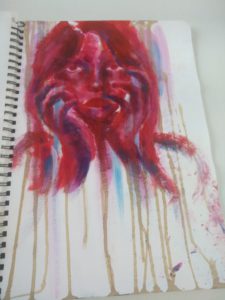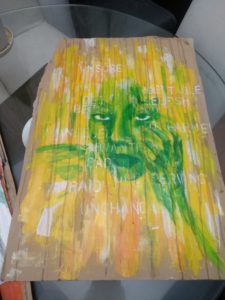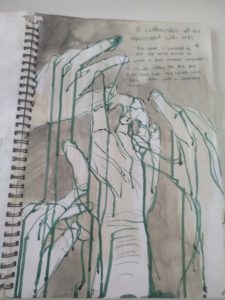Ringside Report Op-ed: Depression Within a Family & Their Hopes That It Helps Another Family
“I am really OK, dad” – My daughter’s journey to overcome depression.
A few weeks ago, a friend on Twitter shared that a young man committed suicide from depression, because his family disowned him after he came out being gay. Even though a loving, kind-hearted family took him in as one of their own, the verbal abuse and ousting he had suffered from family and friends destroyed his spirits so much that he couldn’t find a way out. It was one of the most devastating days in my life. Since that day, I’ve been wanting to share my daughter Arella’s story, hoping to increase awareness on how to help our loved ones combat depression.
My daughter has a very happy, kind-hearted and loving persona. She places everyone first even at a very young age. I remember one occasion when she was barely 20 months old, I took her to the 7-11 to get some ice cream. We lived in a gated community in Taiwan then and it’s relatively safe. On the way to the store, we walked by an unattended baby carriage as our neighbors were busy dropping recyclables and trash as the sanitation trucks were doing their regular collection rounds. I knew the parents must be nearby so I didn’t think much of it, but Arella refused to leave until the parents came back to their baby. I knew then that Arella will always put everyone else’s safety and well-being as one of her priorities in life.
A few years later, I got a good job offer but needed to relocate to Hong Kong. Fortunately, we found a really good school for Arella, where she started at K3 and is now in her senior year. Along the way, she met some really amazing friends and she has also met her fair share of bullies. In hindsight, however, I wish I had kept her in Taiwan with my parents, where the surrounding was familiar and comforting for her. Little did I know till years later that she found herself alienated in a very different environment, and that’s why she tried harder to make friends and satisfy everyone’s expectations at the cost of her very young and still developing mind.
Three years ago, I started working in Macau, a city that’s only 1 hour away from Hong Kong by Hovercraft, and I get to spend time with Arella over the weekends, which at the time seemed to suffice. Little did I know that one of her best friends, someone she grew up with at school from Primary 1, turned on her because she chose her abusive boyfriend over Arella. Arella being the protective friend, advised her ex-friend to stay away from the boyfriend who the ex-friend claimed had sexually assaulted her. It did work at first, but that “friend” somehow chose to reject Arella’s advice and joined forces with her ex-boyfriend and started bullying Arella at school and on social media by verbally abusing her and calling her despicable names.
 Arella never spoke a word of it, she continued to act happy in front of us (my mom, her mom and me), but her schoolwork started to decline significantly. This happened at the peak of the pandemic, when she stayed home and took classes via Zoom. I received messages from school regularly about how she missed classes and was late with submitting homework. As I was in Macau, I would normally, and blindly, just call home and had my mom and helper wake her up immediately for classes. I would call her at night and encourage, sometimes even sternly demand, her to hand in her work on time.
Arella never spoke a word of it, she continued to act happy in front of us (my mom, her mom and me), but her schoolwork started to decline significantly. This happened at the peak of the pandemic, when she stayed home and took classes via Zoom. I received messages from school regularly about how she missed classes and was late with submitting homework. As I was in Macau, I would normally, and blindly, just call home and had my mom and helper wake her up immediately for classes. I would call her at night and encourage, sometimes even sternly demand, her to hand in her work on time.
Then one weekend when I was home, I found out that she has been cutting her arms with a utility knife regularly. My mother reacted with “If you ever do that again, I will cut myself too”, which I knew wouldn’t help. Arella’s mom was somewhat better, but only told her to ignore those bad friends, never bothered to find out exactly what started these self-inflicted injuries. I spent a great deal of time talking to Arella, but she was already fairly locked up with her emotions by then, although I was able to find out her emotional turmoil stemmed from her one-time best friend’s betrayal. She became quite temperamental, often talking back at her grandma and mom, and when she finally calmed down and apologized, she would often end her apologies with “I am just a really bad person”.
Thankfully, my company offered us an opportunity to work from home and report to the head office in Hong Kong at that time, and I jumped at the opportunity so that I could spend more time with Arella, and I am glad I did. One Wednesday afternoon as I was in a Zoom meeting, her school’s Deputy Principal called and asked me to go to school straight away as Arella had had an “accident”. I immediately rushed to school and when I saw her at the nurse’s office, she had bandages around her ankle, elbows and knees. It had occurred to me that she had a bad fall at first. But then when I met the Deputy Principal, I found out that she had skipped class earlier and was hiding in one of the stairwells. When school security found her, she immediately jumped off the balcony! Although it was only on the second floor, but Mr. Harrison said had she landed badly, it would have easily had ended her life! My world had completely collapsed that day and I realized we hadn’t done nearly enough for Arella.
For the next few months, I spoke to Arella daily helping her explore and face her pains. I finally found out on the day of her attempted suicide, she was merely hiding away from her ex-friend, because she was afraid to face her and be verbally abused, and it was extremely painful for her to face the betrayal. She continued to blame herself for the failed friendship, and that was perhaps the worst injury. It was not easy to help her see she had not done anything wrong, and was in fact being a truly good friend and person by helping others. It is by then I realized that depression takes many different forms, one of the worst is how the person suffering thinks so little of themselves, they no longer see any self-worth, they feel that they are a mistake and should be erased. In addition to that constant pain and self-loathing, she was still trying hard to become “somebody” to her ex-friend. She still did not see the damages that friend had caused from her betrayal.
It was that day I decided to take a deduction in pay and take a different role in the company’s Hong Kong office so that I could be there for her at any given time.
Over the last six months, I’ve finally seen improvements in Arella. She now can more openly talk about the pain she felt from the betrayal but in a healthy exchange with me. She finally chose to block this ex-friend from all social media, finally realizing the devastations this friend has brought to her life. But most of all, her mental health is stable. Once shy and locked up from making new friends, she now has positive relationships with a group of fine young teenagers, with whom she studies and play online games with. More importantly, she has a very caring and empathic Head of Year, who encourages her and talks to her daily at school.
She had decided to tell her struggles via Art, of which she has a true talent in, and I would like to share that with everyone here. These pictures do tell the story of a young kind soul suffering from depression.
Arella’s journey to overcome depression has taught me a few important things that I wish to share.
• It is very important to identify with the love one who is depressed. It is better to genuinely feel their pain than to share “lessons learned”. I shared with Arella how I was bullied in my Primary school years, and how everybody said to me, “deal with it”, “ignore them”, “I was bullied too and this is what I did…”, and how those “advices” never made me feel better. Don’t take me wrong, sharing a personal experience on how depression was overcome is necessary as well but at a later time.
• Find out as much as possible the things that made them lose their sense of self-worth and confidence. In Arella’s case, it was the betrayal, and her personal denial that her “best friend” would turn on her even though she knew she had the best intentions. These two factors made her feel useless, unwanted, a bad person, and pointless to live.
• Encourage them to take the lead in conversations. When Arella was feeling a little better, I often asked her, “How are you feeling today?” It was a general question but with persistence, I was finally helping her to open up. It started off with some general response, “I am fine”, “I feel OK” at first, but that gives me a chance to further the conversation with “I am glad you are able to get in touch with your feelings, but what can I do to help you feel even better?”. Sometimes she would say, “I don’t want to talk about it, dad”, and other times she would say, “I am still hurting and I don’t know what to do”. When she responded with the second comment, it actually gave me a chance to say “What were some of the things you did today that made you feel you were in control again?”
• When Arella finally found her confidence again and wanted to tell her story through art, she would often ask me what I thought of her drawings. Other family members would often praise her artistic talent with general pleasantries like, “it’s beautiful” or “I am so proud of you”, etc. Believe me, it works but that’s not what she was looking for. I would take the time looking at the overall picture, then comment on how she was able to present her pain and suffering with such power, and how that would help others see her world. That actually encouraged her to further conceptualize the stories she wished to tell. I also noticed that the more she was able to confront those old demons, her pictures became even more powerful. The more powerful her pictures, the happier she became.
• Arella was shy from making new friends for a long time because of this traumatic experience. I would often ask her, “with this experience, how would you find new and trustworthy friends”? This is still an ongoing conversation, but the more she talks about it, the more opened and confident she became. Happily, her new group of friends are a very encouraging and empathic group. More importantly, she still has two friends who grew up with her giving her the loyalty, support and love needed.
I know I don’t have all the answers on how to help a love one overcome depression, and I am still learning as each day goes by. The things I have learned so far are fairly effective but I know each individual has unique and different needs. But I can assure everyone that the first thing is not allowing them to feel worthless, this is the one thing that could have taken Arella away from me, and I thank God every day that she came off with relatively mild injuries from her jump. Being there for a love one who is depressed is important, but I did find that the identification and admitting how depression affected me personally bridged a stronger connection between Arella and me, and that perhaps started a turning point in her young life.
I hope you find my sharing useful and please do share with me more suggestions, so that I can help more family and friends in their fight against depression.




